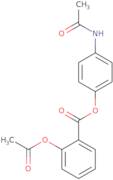Benorylate
CAS : 5003-48-5
Ref. 3D-FAA00348
| 1g | Arrêté | ||
| 5g | Arrêté | ||
| 10g | Arrêté | ||
| 25g | Arrêté | ||
| 25mg | Arrêté | ||
| 250mg | Arrêté | ||
| 500mg | Arrêté |
Informations sur le produit
- 4-(Acetylamino)Phenyl 2-(Acetyloxy)Benzoate
- 4-Acetamidophenyl 2-acetoxybenzoate
- 4-Acetaminophenyl 2-acetoxybenzoate
- 4-acetamidophenyl O-acetylsalicylate
- Acetanilide, 4′-hydroxy-, salicylate (ester) acetate (ester)
- Acetylsalicylic acid paracetamol ester
- Aspirin acetaminophen ester
- Benoral
- Benortan
- Benzoic acid, 2-(acetyloxy)-, 4-(acetylamino)phenyl ester
- Voir d'autres synonymes
- Fenasprate
- Quinexin
- Salicylic acid acetate, ester with 4′-hydroxyacetanilide
- Salipran
- To 125
- Win 11450
- p-Acetamidophenyl acetylsalicylate
- p-N-Acetylaminophenyl acetylsalicylate
Benorylate is an analytical method for the determination of sodium citrate in biological samples. It is used to determine the amount of sodium citrate in blood, urine, and other bodily fluids. The matrix effect can be minimized by using a high concentration of sodium citrate. The concentration of rhizoma gastrodiae (a Chinese herb) in this solution has been shown to be effective at inhibiting the formation of biofilms and reducing inflammation. Benorylate has been shown to have long-term toxicity, as well as toxicity studies that are not statistically significant.





